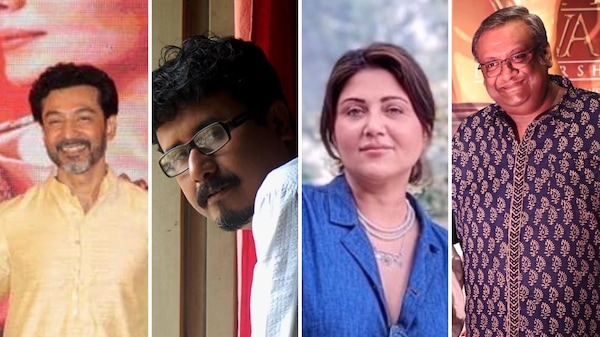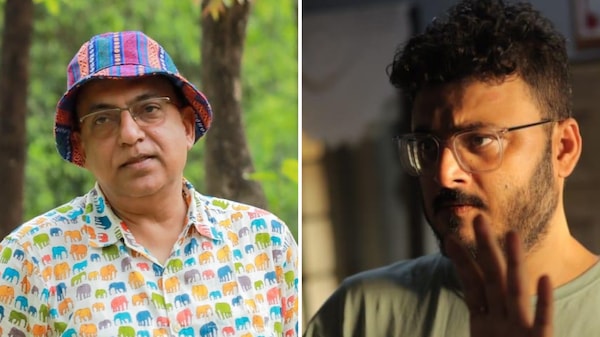Anurag Kashyap’s ‘Ghatiya’ comment: Where does the Bengali film industry really stand?
Does the Bengali film industry make enough impactful films? Is there a fair distribution channel for the filmmakers? Is it conducive for independent filmmakers?

Last Updated: 11.55 AM, Feb 22, 2024
Anurag Kashyap stirred a hornets’ nest with his ‘ghatiya’ comment on the Bengali film industry. Along the audience, the key players in the Bengali industry have got engaged in a raging conversation on social media debating over his statement. The Black Friday director said that the standard of Bengali film used to be on the top of Mount Everest during the time of Satyajit Ray, Ritwick Ghatak, Mrinal Sen, and others. There has been a ‘colossal’ fall in its standard from that height. He further stated that the standard of Hindi cinema has also fallen, but that was a fall from the ‘first floor’; hence, the impact is less visible.
Has the standard of Bengali films gone down? Film historians are the fittest to answer. Here are some facts. According to Wikipedia, the Bengali film industry registered a value of around Rs 120 - 150 crores in terms of revenue in 2014. But the figure diminished over the years to Rs 66 crores in 2023.
There is little scope to verify the box office collections since there has not been any authorised aggregator. But again, can we measure the standard of cinema based on box office collection? Surely not. There has to be other measures. Filmmakers like Aparna Sen, Aditya Bikram Sengupta, Indranil Roychowdhury, Indrasis Acharya, and others still bag nods from global film festivals. But once again, is that enough? Does the Bengali film industry make enough impactful films? Is there a fair distribution channel for the filmmakers? Is it conducive for independent filmmakers? Most importantly, is there any room for this debate within the zBengali industry? As social media is divided between for and against Anurag’s statement, it becomes important for us to find out what the players in the Bengali industry think about their work.
Is Anurag Kashyap being misconstrued?
Arindam Sil said that Anurag Kashyap perceived this idea because of ‘outside influence’. “Anurag is a friend and I know he can be quite straightforward. However, he also mentioned that he did not watch many Bengali films in recent years. The problem with us is, however, that we tend to pull others down. In Mumbai, the entertainment industry stands together in a difficult time. Even a mediocre film like Pathaan gets support from all the quarters. In Bangla, it never happens,” said the director.
Actor Tota Roy Chowdhury, who has worked with filmmakers like Rituparno Ghosh, conceded that Anurag Kashyap has a point. According to the actor, the filmmaking process has changed globally, and like all the other countries, it is impacting Bengali cinema as well. “Anurag perhaps used a harsh word but instead of reacting randomly, I would like to go a little deeper into what he meant. We all agree that during the Golden Age of Bengali cinema, we had a plethora of talents like Ray, Ghatak, and Sen and they took our films to new global heights. The ’60s, ’70, and ’80s were the golden era. There is no denying it. That’s our legacy. Our films used to be identified as Indian cinema on global platforms like the Berlin, Cannes, and Venice Film Festivals,” said the actor.
‘No longer solely a director’s medium’
Tota further argued that filmmaking is not just the director’s medium anymore. “We had world-class directors, who used to make films on their terms. Things have changed. The new millennium brought some incredible changes. Films are now weighed in terms of return on the investment. Films are now often made only to be sold. Cinema is no more solely a director’s medium. Producers, distributors, and even, actors have their say in it. I would like to take Anurag’s comment as a backhanded compliment as he correctly identified the zenith of Indian cinema,” he said.
Also read: Exclusive! Anurag Kashyap: Animal has galvanised more feminists than many other feminist films

Perception of Bengali cinema outside Bengal
Anurag’s comment is being dissected as to how filmmakers outside Bengal see the state of Bengali cinema. PI Meena-director Debaloy Bhattacharya, whose recent venture Shri Swapankumarer Badami Hyenar Kobole has been critically appreciated, thinks Kashyap’s statement is based on his perception. “His statement is not about one or two films. It is how a man (a filmmaker) from another state sees the Bengali entertainment industry. And our industry is indeed like the state of Bengali football. There is madness but rarely any goal,” he said.
Meanwhile, National Award-winning director Kaushik Ganguly refused to comment on this issue. However, he said that he is proud of this industry. “This is my industry and I am proud of it. If we want to debate about the standard of our films, I shall be happy to do it two months later (when the controversy has doused) and not based on what Anurag Kashyap had said,” the Nagarkirtan director said.
The impact of Ray, Ghatak, and Sen
Swastika Mukherjee, who works steadily in Bengali and Hindi OTT and films, said one has to watch films to conclude as Anurag did. “I have been a fan of his work. I did not watch his recent films hence I cannot comment on the standard of his film. Similarly, it is only logical to say that he has to watch recent Bengali films to comment on our films. If he hadn’t watched anything in 10/15 years, it doesn’t make sense for him to say anything about the current films. I have been working here for 24 years. Something is surely happening here as we can see the industry is still functioning. Also, we must get out of the hangover of Satyajit Ray, Ritwick Ghatak, and Mrinal Sen. We surely watch and study their films but we will also have to more on them. We need serious discussions,” said the actress.
Is the Bengali industry conducive for independent and new filmmakers?
Swastika pointed out that there are good films in the Bengali industry. However, she unequivocally stated that it is because of a skewed distribution model, that good films and independent new filmmakers are often ignored. She said, “Does our Bengali film industry get a better support system to showcase good films? Indranil Roy Chowdhury’s Mayar Jonjal is a better film than Pathaan in my opinion. How many good shows at the prime time did Mayar Jonjal get last year? Are we aware of the bitter conversation between the distributors and a new filmmaker? It completely smashes the confidence of a newcomer. I would think films like Pradipta Bhattacharya’s Rajlokhi O Srikanto, Abhijit SriDas’s Bijoyar Pore, or Mayaar Jonjal did not get support from the industry itself. The distribution system shoes away the independent filmmakers. Unless these films get a chance of at least a week right at the prime time, what’s the point in discussing the standard of Bengali cinema?’
Cannot ignore the socio-political impact
It has often been argued films that are bereft of socio-political state are less impactful in the long run. Elaborating on this, Debaloy said that film, an art form, is not independent of culture. “Any art form comes from the culture of a society. The culture depends on a lot of aspects, including the socio-political state of a society. If there is a general deterioration in society that will surely impact the standard of films,” he said.
‘No room for debate’
Director Indranil Roychowdhury wished for a bit more democratic atmosphere within the industry. According to him, way before Anurag Kashyap’s statement, the stakeholders in the Bengali industry should have engaged in a serious debate. But he thinks there is no room for that in the industry. “We are reacting to a wrong stimulus. Today people are busy on social media because a filmmaker from outside the Bengali industry has said something about our cinema. But what about our internal debates and conversations? If there were any room for a healthy cultural debate within our industry it would have been better for us. We needed this conversation within the film industry 20 years ago. Evidently, we have no interest in the serious debate. Instead, people are often afraid of having a conversation. I personally stay away from commenting on others’ works because I fear my comments will be misconstrued. My intentions will be questioned and people will try to find my ‘motive’. Hence there is no room for any healthy conversation. Today’s social media reactions after what Anurag said prove we have nothing better to do. It is a comment on us not on his statement,” the director commented.
